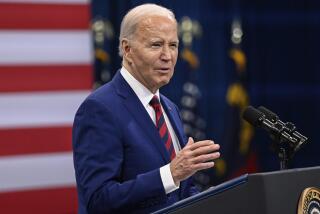Governor Is Ousted in Alaska Vote
SEATTLE — Shortly after Frank H. Murkowski was elected governor of Alaska four years ago, he gave his daughter, Lisa, one heck of a Christmas gift: his seat in the U.S. Senate, which he had held for 22 years.
But the fatherly gesture didn’t go over big with voters and proved to be the first in a series of political controversies that dogged the elder Murkowski.
His stint as governor, intended to cap the career of one of Alaska’s most durable public figures, ended Tuesday night in a humiliating defeat, as the 73-year-old finished third in a three-candidate Republican primary.
With 87% of precincts reporting Wednesday evening, Sarah Palin, a former mayor of Wasilla, a city north of Anchorage, was ahead with 51% of the vote. Former state Sen. John Binkley finished second, with 30%, and Murkowski drew 19% of GOP voters.
Murkowski’s predecessor as governor, Tony Knowles, easily won the Democratic primary.
Murkowski’s defeat was another high-profile rejection of an incumbent in a party primary, coming on the heels of Democratic primary losses for Sen. Joe Lieberman of Connecticut and Rep. Cynthia A. McKinney of Georgia.
But Alaska political experts cautioned against reading too much national significance into the result. The main reason for Murkowski’s loss, they said, was public anger over a host of local issues, including decisions to appoint his daughter to his vacant Senate seat and to buy a state jet after the federal government and the state Legislature denied funding for it.
Critics also denounced him for not seeking more public comment on a multibillion-dollar tax deal with major oil companies intended to fund a natural-gas pipeline from Alaska’s gas-rich North Slope to the Lower 48.
He even managed to tick off older voters by cutting back on a subsidy for eligible seniors known in Alaska as the “longevity bonus,” said Carl Shepro, a professor of political science at the University of Alaska Anchorage.
“I don’t think this has got a lot to do with national politics or anything,” Shepro said. “Basically, this is a guy who made a lot of people very unhappy for various reasons.”
The state’s Democratic Party chairman, Jake Metcalfe, said he detected some populist trends that could reflect national discontent. He noted that as Murkowski went down to defeat, the cruise-line industry also suffered a blow: A measure imposing a $50-per-passenger tax passed narrowly despite a raft of industry-supported ads against it.
“It seemed like a referendum in a way that showed people were tired of big oil and big cruise lines running things and having all this influence” in the political process, Metcalfe said. But, he added, he agreed with the analysis that Murkowski sowed many of his own difficulties.
“I’ve lived here all my life, and I’ve been politically active since I was a little kid, and I’ve never seen outright anger and hostility toward a politician like I’ve seen against Frank Murkowski,” Metcalfe said.
Murkowski declined an interview request Wednesday, though he said through a spokesman, “The people of Alaska, evidently, would like a change. I’m proud to have served them.”
Murkowski’s supporters said he was unfairly punished at the polls for trying to get the state to grapple with big issues, like reining in the budget or financing the gas pipeline.
And they downplayed the controversy over his appointment of Lisa Murkowski, then a state senator, to the U.S. post. After all, she won the 2004 election to hold onto the seat, garnering almost 49% of the vote to defeat Knowles, who had almost 46%.
Knowles stepped aside as governor in 2002 because of a state law limiting the office-holder to two consecutive terms. Having been out of office, however, he is now eligible to run again.
The gubernatorial election is considered something of a toss-up. Knowles has more name recognition than Palin, and he may benefit from the presence of an independent candidate, Andrew Halcro, a former Republican state representative.
On the other hand, the state has voted solidly Republican in presidential and congressional elections in recent years, and GOP leaders said they would be united behind Palin.
Murkowski even visited Palin at her victory celebration, telling her: “Congratulations; you’ve got my support. I’ll do everything to see that you’re elected.”
Binkley, the other candidate in the GOP race, deflected questions about his political future by turning to a decidedly nonpolitical pursuit.
“Right now,” said Binkley, “I’m focused on going moose hunting.”
More to Read
Sign up for Essential California
The most important California stories and recommendations in your inbox every morning.
You may occasionally receive promotional content from the Los Angeles Times.










